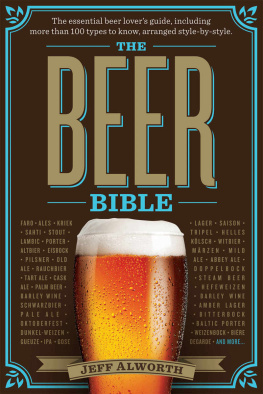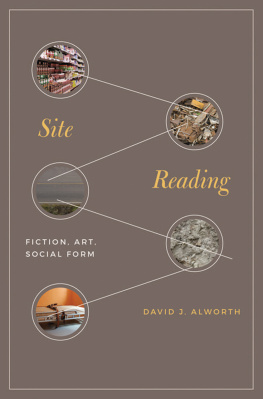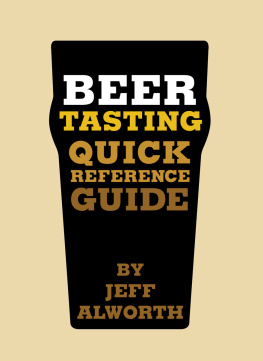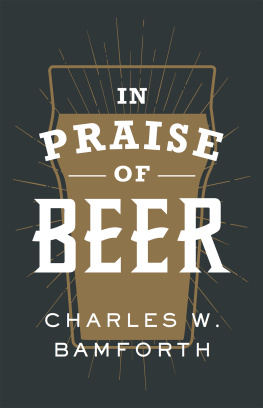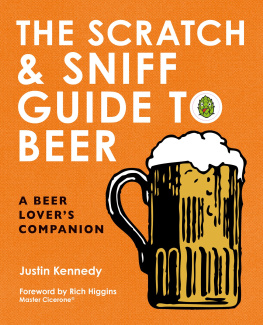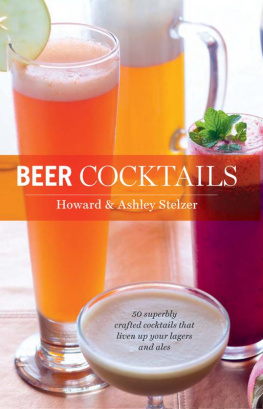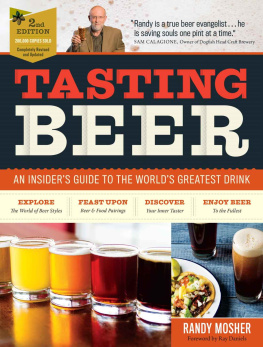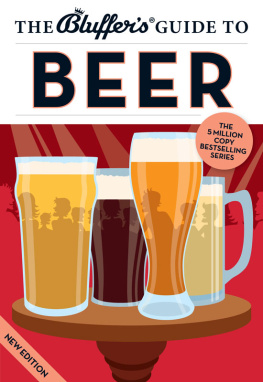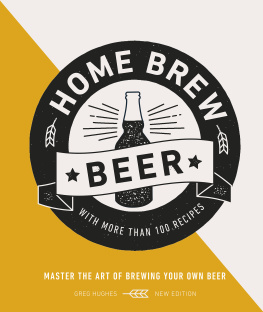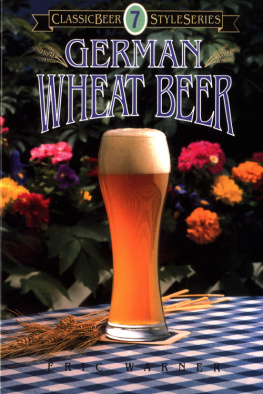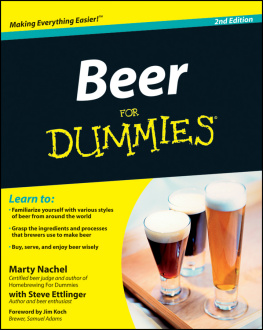JEFF ALWORTH
THE
BEER
BIBLE
WORKMAN PUBLISHING NEW YORK
For Sally,
to whom I owe the world
or, at the very least, Italy
ACKNOWLEDGMENTS
W HEN YOU LOOK at the cover of a book, theres usually just one name there. Often an author will mention some folks who supported him or helped along the way. In the case of The Beer Bible, it would have been literally impossible for me to complete the book without the help of dozens of people. Folks like the English writer Zak Avery, who helped me contact British breweries to set up visits. Or importers Wendy Littlefield, Matthias Neidhart, and Michael Opalenski, who did the same for me in France and Belgium, Germany, and Italy. Wendy and Michael were wonderful in sharing their impressions of the Belgian and Italian brewing worlds, helping educate me as well as connecting me with brewers in Europe. I want to give a special dkuji to Max Bahnson, who spent two days giving me a tour of Prague, and another to Patrick Emerson, who not only joined me on the trip around Great Britain, but had the courage to take the wheel of the Vauxhall.
I had personal advisors who used their years of experience to illuminate and guide me on this long road: the writer Stan Hieronymus, who has done more to advance our understanding of beer than anyone in the past decade; brewer Alan Taylor, the hardest-working man in beer at Pints Brewing, Ponderosa Brewing, and (soon to be) Zoiglhaus Brewing, who helped me overcome my fear of lagers; and Portland, Oregonbased chef Paul Kasten, who revealed some of his alchemical secrets. You spent far more time than you needed to answering what must have seemed like obvious questions.
Another revolution in our understanding of beer has come thanks to a cohort of exceptional historians. These folks have looked at primary sources in the brewing record going back centuries, and have help loosen our attachment to persistent old myths. Im thinking especially of Martyn Cornell and Ron Pattinson, both of whom graciously agreed to look over my history sections to prevent any howlers from getting out in the world. Richard Unger and Ian Hornsey have also done indispensable work. Closer to home, Maureen Ogles history of American brewing has been essential reading.
If you look at the end of the book, youll see the names of more than fifty brewers who took the time to speak with me about the beer, of which three dozen took me on tours of their breweries. Some of those names are the most esteemed in the business, and one of the enormous pleasures of writing this book was spending time looking inside mash tuns and up at towering conditioning tanks. In esk Budjovice (Budweis), Adam Bro guided me by flashlight through a brewery darkened by electrical work. Standing with John Bexon under Crown Street in Bury St Edmunds, England, in a tangle of pipes running to the bottling line, conspiratorially, he said, Not many people have been down here. Showing up on the wrong day at Belgian brewery Rodenbach and having Rudi Ghequire give me a tour, anyway. Standing in the mists made by hot wort pouring into the cool ship at Cantillon, drinking aged Vintage Ale in the cellars at Fullers, dining with the folks at Lambrate, sampling sticke alt from the tanks at Uerige, smelling the fresh yeast of open fermenters at Schneider, meeting Teo Mussos mom, discussing German guilds at Schlenkerla. These memories (and many more) are treasures Ill carry a lifetime.
The list goes on. James Emmerson not only manages a large American brewery (Full Sail), but he checked my technical sections for accuracy. Evan Rail made sure I didnt get Czech beer wrong. Jo and Jerry Lane, Gene Alworth, and Sally Alworth all remember the fitful progress that led to this bookcoming in on two decades nowand were there to hold my chin up along the way.
Finally, I want to thank the folks at Workman Publishing for entrusting me with The Beer Bible. I worked closely with Kylie Foxx McDonald for a year before signing the contract to write the book and for the nearly four years it took to bring it to publication. I thank her especially, but also all those who were guiding things along behind the scenes.
Whatever richness you find in this book, think of them when you appreciate it. I do.

Portland, Oregon
May 2013
CONTENTS
PART ONE
KNOWING BEER
PART TWO
ALES
PART THREE
WHEAT BEERS
PART FOUR
LAGERS
PART FIVE
TART AND WILD ALES
PART SIX
ENJOYING BEER
HOW TO USE THIS BOOK
I N 2001, the wine educator Karen MacNeil published a book called The Wine Bible. A conceptual triumph, it manages to take more than nine hundred pages of information and put it into a form that is instantly understandable by even the layest of laypeople. MacNeils steady voice, lyrical and accessible yet authoritative, guides you through the rolling hills of Italys Piedmont and the Maipo Valley of Chile. Wine is a drink of place, the grapes that make it defined by the heat of the sun and elements in the earth. MacNeil acts as an expert guide on a world tour.
Beer is a little different. It is also a drink of place, but not in the same way. Culture and history exert at least as great an influence as where the barley and hops are grown. Beer types or styles are manifestations of these influences, and act as the organizing principle of The Beer Bible. Mostly. It turns out movement is also the nature of beer styles. Porters jump seas and become stouts; pilsners cross borders and become hellesbiers. Places like the United States, Italy, and France pick up brewing almost from nothing and rebuild it like immigrants do, borrowing this, dumping that, scrambling x and y. Styles mutate and change. Remember that as you read about these styles, and recall that even though we wouldnt dare to question the legitimacy of Munichs famous helles beer now, once a pale lager was so radical that the citys brewers nearly had a civil war over it. Todays abomination is tomorrows treasured tradition.

WHERE TO BEGIN
Some people who come to this book will be new to beer, perhaps enticed by the burgeoning world of craft beers; others will be old hands who want a little more information about their favorite styles. Whoever you are and whatever your reasons, youll thumb around and drop into sections that interest you. The book is designed to be read in pieces; Karen MacNeil had the insight to structure The Wine Bible that way, and I happily followed her lead (though this book is segmented by style, not region). The first part of the book will give you some of the important background to understanding beer, but you might prefer to dip into it elliptically, to backfill as necessary. You may not be compelled to read through descriptions of the strange flavors of beer, for example, until you encounter thats where youll find the concepts and terms important to the sensory experience of beer that are repeated in nearly every chapter.
WORLD BREWING TRADITIONS
Im an American, but this is not a book solely or even centrally about American brewing. Even though breweries in the United States now make every style of world beer, Ive written about the traditions from their origin points. There are lots of American pilsners and abbey tripels, but when you flip to chapters about those styles, youll find a discussion of Czechs and Belgians. Craft brewing has sparked a renaissance in countries throughout the world, but this book does not spend a lot of time talking about all the various international interpretations of each style.

